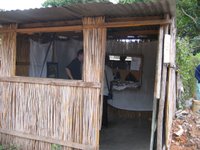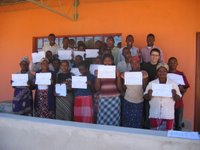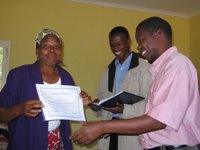Celebrating at T3 Church
On Sunday morning, Laura and I commemorated several firsts and a farewell: our first time going to church in T3 (a suburb of Maputo), our first time sitting in a church service that lasted over three hours (3 hours, 35 minutes, if you count from the time it was supposed to start), and a farewell celebration for Bruce and Mabel Callender, who have been living in Mozambique building churches for 10 years. This was their last Sunday before retiring.
The video makes apparent the great level of appreciation and admiration that the Mozambicans have for Bruce and Mabel for their help through much hardship over the past decade.
The community was also celebrating because that morning was the first time that the church had met in their new building. They had previously been crowding into a smaller caniço structure next door. (Today also marks the first time that I've tried video editing, using the "video" mode on our still camera and the free software that comes with Windows, no less. Move over, Hollywood!)
(Today also marks the first time that I've tried video editing, using the "video" mode on our still camera and the free software that comes with Windows, no less. Move over, Hollywood!)
Laura had the idea of posting some video footage of this morning's service. What a great way to open the window into our world just a little wider. Please let us know if the video has worked for you -- if it's an effective tool, we could try to extend the experiment a little further.
So, whenever you're ready to glimpse today's African celebration, pop some popcorn, throw up your feet, and roll the clip -- today's feature is about 35 seconds long.










